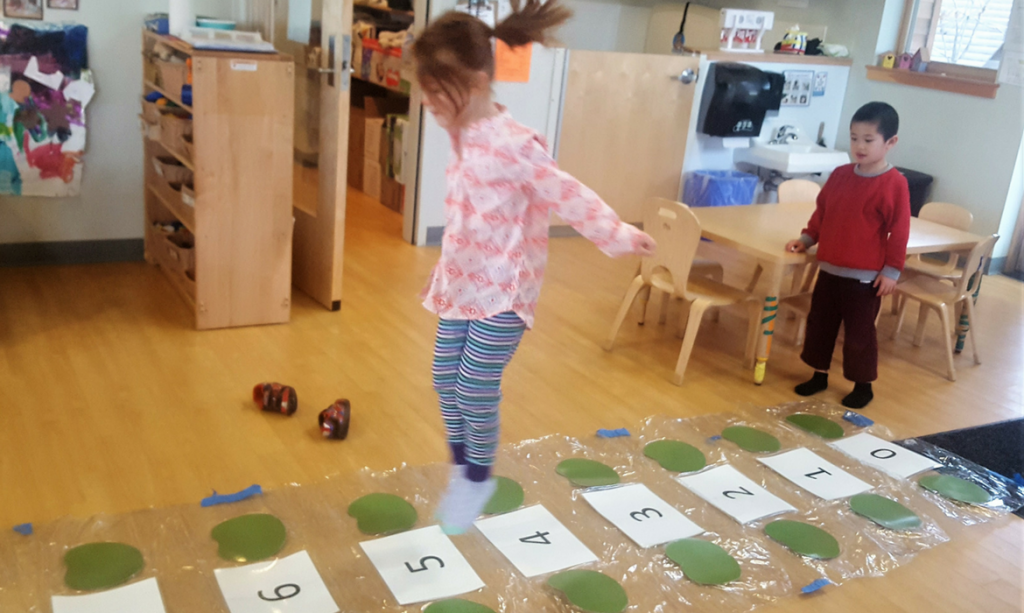“Playful math?” Yes! For young children, play and mathematics go together seamlessly and naturally. With simple materials and a little planning, early childhood educators can use games to help spark important mathematical ideas—and help them learn a lot about children’s thinking.
Why Math Games?
Math games provide a structure and process for children to engage in problem solving in order to reach a particular goal or objective. Reaching that goal might be challenging, but the challenge is also what makes game-playing fun. In a game, children can play alone or with a group, they can make their own decisions about the moves they will make, and they can play over and over again trying out different strategies.
In addition to all the foundational mathematics learning going on while they play games, children are building their confidence as problem solvers and practicing important social-emotional skills. Games in the preschool classroom also provide teachers the opportunity to gain insights into children’s developing mathematical thinking.
Persistence and problem solving Games are an ideal vehicle for children to practice persistence and problem solving as they try out new strategies and encounter difficulties. They can see what works and why, and try again without the pressure of doing it “right.” Teachers can support the development of children’s persistence at challenging games and of their confidence as problem solvers.
Social-emotional development Playing games with classmates fosters social and emotional skills like being patient, taking turns, and solving problems collaboratively. Games with an element of competition also give children an opportunity to practice winning and losing graciously and with respect.
Teacher observation As children engage in game-play, preschool teachers have a rich opportunity to observe children’s thinking, reasoning, and math skills at work. For example, as a child moves a game piece along a number path in a board game, the teacher can observe whether the child can recite the number sequence accurately and maintain one-to-one correspondence.
Repetition and practice Finally, games give children repeated practice, as they enjoy playing the same games over and over.
What’s the Math?
Using games as a foundation for learning, and with input from over one hundred Head Start teachers, EDC’s Games for Young Mathematicians has developed a set of instructional materials for preschool teachers that are fun, engaging, and easy-to-use. Games and accompanying resources on the Young Mathematicians site focus collectively on counting, operations, algebraic thinking, and geometry.
These games are designed to be adaptable, with multiple entry points so they are appropriately difficult for all children. For example, children who are at the beginning of their mathematics learning can engage with small numbers and simpler versions of the games; children who are further along are challenged with additional choices (e.g., you can add or subtractthe quantities on a die).
Below is a sample of games focused on number sense. Number and operations skills are foundational for later mathematics learning [1] and represent a large portion of early childhood math learning standards. The following games are examples that highlight these key number and operation skills:
- recognizing and knowing the number word list ,
- subitizing (knowing how many in a small set immediately),
- cardinality (knowing that the last number of objects counted is the number in the set),
- one-to-one counting correspondence (pairing one object with exactly one number word),
- written number symbols,
- comparing numbers (more, less, same), and
- composing and decomposing numbers (addition and subtraction).
Games with Fingers
Simple games with fingers focus on key skills including counting, cardinality, subitizing, and combining and taking apart sets. New research shows that using fingers plays an important role in learning and understanding arithmetic (despite what we might’ve been told!). [2] You can also play finger games at any time—since your fingers are always with you!
Try this simple finger game. Hide your hands behind your back, then show your hands holding up a few fingers on each hand. For example, show three fingers on your right hand and two fingers on your left hand. Children love it when you chant a little rhyme before revealing your fingers: “Fingers, fingers, 1,2,3, how many fingers do you see?” Children then call out how many fingers you are holding up.
To make the game a little more challenging, ask children to use both hands and show five in a different way. You can also ask children show you on their fingers one more or one fewer than the number of fingers you held up. As children get older and have more practice, you can even ask them how many fingers you are notraising.
Games with Dot Cards
Dot cards provide a wealth of game options for young children to practice subitizing, counting, and cardinality. Children use cards that have from one to tenblack dots arranged in different configurations—linear (straight line), rectangular, dice pattern, circular, and scattered. The dots are arranged in different configurations because the variety helps children develop many mental images of quantities. Children need practice with objects in lots of different arrangements. In particular, circular and scattered arrangements are harder to count one-by-one.
Children can also play with these cards in different ways: covering dots, copying the patterns, matching cards, finding a certain card, and figuring out one more or one fewer. For a book link, we suggest the picture book Ten Black Dotsby Donald Crews. Children can use this as inspiration to make their own illustrations with dots at the art table. For a home link, teachers can send home the mini-book Can You Find?for children to read with their families. On each page children try to find the card with a certain number of dots.
Jumping on the Lily Pads
Children play Jumping on the Lily Pads with a lily pad number-path board, dot cubes, and frog game pieces (or other tokens). This game helps children develop a mental number line and understand that whole numbers are spaced equally along a number line. The more that children develop a mental number line, the more prepared they are for the math tasks that await them in kindergarten. [3]
To play the game, children take turns rolling the dot cube and moving their frogs along the game board. The goal is to be the first to reach the pond. While playing this game, children are practicing numeral recognition, using one-to-one correspondence (when moving on the board), and using vocabulary such as before, after, closer, further. Jumping on the Lily Pads give students experience with a mathematically crucial tool—the number line—and strategic use of that tool.
As you introduce more math into your classroom, be positive! Your attitude matters, so have fun introducing and integrating math activities. Use books and games to promote playful math experiences. It’s as easy as playing finger games, card games, and board games to build young children’s understanding of number and the number line!
[1] National Research Council. 2009. Mathematics Learning in Early Childhood: Paths Toward Excellence and Equity. Washington, D.C.: The National Academies Press. https://doi.org/10.17226/12519.
[2] Berteletti, I., & Booth, J. R. (2015). Perceiving fingers in single-digit arithmetic problems. Frontiers in Psychology, 6, 226. http://doi.org/10.3389/fpsyg.2015.00226
[3] Siegler, R. S. & Ramani, G. B. (2009). Playing Linear Number Board Games – But Not Circular Ones – Improves Low-Income Preschoolers’ Numerical Understanding. Journal of Educational Psychology, 101(3), 545–560.



